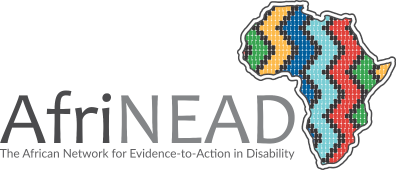

Origin of AfriNEAD
The African Network for Evidence-to-Action on
Disability (AfriNEAD) was founded in 2007 to ensure that networking and research contribute to a better quality of life for people with disabilities in Africa. AfriNEAD is a flagship project of the Centre for Disability and Rehabilitation Studies at Stellenbosch University.
AfriNEAD’s aim is to facilitate evidence-to-action in the disability field so as to impact for real change in the quality of life of people with disabilities in Africa. There is a need to translate research into evidence-based advocacy, practice and policy – particularly in the pan-African context and systematically addressed in a coherent and consistent fashion.
Our Objectives
Networking between DPO’s, academics, researchers, and the intended audiences for the research (e.g., policymakers, civil society, business) throughout the African continent.
Coordinating and translating research findings into useable and accessible formats for different intended audiences.
Facilitating information-sharing and reviewing, as well as monitoring and evaluation.
Facilitating dialogue between all stakeholders in the disability debate, thus helping to keep the disability debate alive in Africa.
Establishing Disability Research Country Working Groups (DRCWGs) tasked with producing in country research evidence that will assist in disability policy formation/inclusion of disability issues in existing policies.
DRCWGs will identify action pathways and produce Best Evidence-to-Action Practice Guidelines for their countries which would be published on the AfriNEAD webpage.
Assisting member countries to develop a methodology for profiling their own local situation regarding disabled people, the services available to them, the research being conducted and areas needing investigation, and to identify facilitators and barriers for turning evidence to action. These profiles will be published in an e-book on the AfriNEAD webpage.
Facilitating a triannual Africa-wide symposium focusing on a particular issue of interest in order to assess progress on evidence-to-action, consolidate and take the debate forward.
Each event will produce a unique and stimulating collection of papers to be published as a Special Issue of a suitable international journal.
Bridge the gap between academics, Government, business, and the needs of the disabled community.